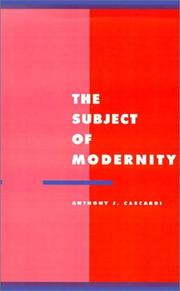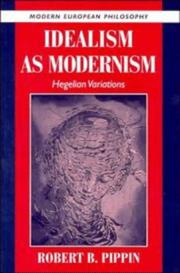| Listing 1 - 5 of 5 |
Sort by
|
Multi
ISBN: 9780521616553 9781139029223 1139029223 9781139206228 1139206222 9781139204644 1139204645 9780521851114 0521851114 0521616557 1107225728 1139199560 1139201824 113920324X 1139205420 1280568364 9786613597960 Year: 2011 Publisher: New York : Cambridge University Press,
Abstract | Keywords | Export | Availability | Bookmark
 Loading...
Loading...Choose an application
- Reference Manager
- EndNote
- RefWorks (Direct export to RefWorks)
This book is concerned with the history of metaphysics since Descartes. Taking as its definition of metaphysics 'the most general attempt to make sense of things', it charts the evolution of this enterprise through various competing conceptions of its possibility, scope, and limits. The book is divided into three parts, dealing respectively with the early modern period, the late modern period in the analytic tradition, and the late modern period in non-analytic traditions. In its unusually wide range, A. W. Moore's study refutes the tired old cliché that there is some unbridgeable gulf between analytic philosophy and philosophy of other kinds. It also advances its own distinctive and compelling conception of what metaphysics is and why it matters. Moore explores how metaphysics can help us to cope with continually changing demands on our humanity by making sense of things in ways that are radically new.
Metaphysics --- Metaphysics. --- Metaphysik. --- Philosophy, Modern. --- History. --- Arts and Humanities --- Philosophy --- Philosophy, Modern --- History --- Métaphysique --- Philosophie moderne --- Histoire
Multi
ISBN: 9783319018997 9783319018980 Year: 2014 Publisher: Cham Springer International Publishing
Abstract | Keywords | Export | Availability | Bookmark
 Loading...
Loading...Choose an application
- Reference Manager
- EndNote
- RefWorks (Direct export to RefWorks)
This volume combines the theoretical and historical perspective focusing on the specific features of a European philosophy of science. On the occasion of the 20th anniversary of the Institute Vienna Circle the Viennese roots and influences will be addressed, in addition. There is no doubt that contemporary philosophy of science originated mainly in Europe beginning in the 19th century and has influenced decisively the subsequent development of globalized philosophy of science, esp. in North America. Recent research in this field documents some specific characteristics of philosophy of science covering the natural, social, and also cultural sciences in the European context up to the destruction and forced migration caused by Fascism and National Socialism. This European perspective with the integration of history and philosophy of science and the current situation in the philosophy of science after the transatlantic interaction and transformation, and the "return" after World War II raises the question of contemporary European characteristics in the philosophy of science. The role and function of the renowned Vienna Circle of Logical Empiricism and its impact and influence on contemporary philosophy of science is on the agenda, too. Accordingly, the general topic is dealt with in two parallel sessions representing systematic-formal as well as genetic-historical perspectives on philosophy of science in a European context up to the present.
Philosophy --- Philosophy of science --- History of philosophy --- filosofie --- geschiedenis --- socialisme --- fascisme --- wetenschapsfilosofie --- Europe --- Philosophy, Modern --- Science --- Philosophie moderne --- Philosophie --- Sciences --- History --- Histoire --- EPUB-LIV-FT LIVHUMAI SPRINGER-B

ISBN: 9780521848589 052184858X 9780521613040 0521613043 9780511614637 1107153050 051118204X 0511115814 0511299966 0511614632 1280416181 0511199260 0511115261 9780511115813 9780511115264 Year: 2005 Publisher: Cambridge, UK ; New York : Cambridge University Press,
Abstract | Keywords | Export | Availability | Bookmark
 Loading...
Loading...Choose an application
- Reference Manager
- EndNote
- RefWorks (Direct export to RefWorks)
The Persistence of Subjectivity examines several approaches to, and critiques of, the core notion in the self-understanding and legitimation of the modern, 'bourgeois' form of life: the free, reflective, self-determining subject. Since it is a relatively recent historical development that human beings think of themselves as individual centers of agency, and that one's entitlement to such a self-determining life is absolutely valuable, the issue at stake also involves the question of the historical location of philosophy. What might it mean to take seriously Hegel's claim that philosophical reflection is always reflection on the historical 'actuality' of its own age? Discussing Heidegger, Gadamer, Adorno, Leo Strauss, Manfred Frank, and John McDowell, Robert Pippin attempts to understand how subjectivity arises in contemporary institutional practices such as medicine, as well as in other contexts such as modernism in the visual arts and in the novels of Marcel Proust.
Kant, Immanuel --- Cogito --- Filosofie [Moderne ] --- Ik (Filosofie) --- Moi (Philosophie) --- Philosophie moderne --- Philosophy [Modern ] --- Self (Philosophy) --- Subjectiviteit --- Subjectivity --- Subjectivité --- History --- Philosophy --- Philosophy, Modern --- Subjectivism --- Knowledge, Theory of --- Relativity --- Modern philosophy --- History, Modern --- Arts and Humanities --- Subjectivity. --- Philosophy, Modern. --- Philosophy.

ISBN: 0521423783 0521412870 0511597428 9780511597428 9780521412872 9780521423786 Year: 2000 Volume: 3 Publisher: Cambridge : Cambridge university press,
Abstract | Keywords | Export | Availability | Bookmark
 Loading...
Loading...Choose an application
- Reference Manager
- EndNote
- RefWorks (Direct export to RefWorks)
The question of modernity has provoked a vigorous debate in the work of thinkers from Hegel to Habermas. Our own self-styled postmodern age has seen no end to this debate, which now receives a major and wide-ranging intervention from the theorist and critic Anthony J. Cascardi. Offering an historical account of the origins and transformations of the rational subject or self as it is represented in Descartes, Cervantes, Pascal, Hobbes and the Don Juan myth, he carries his argument across the fields of epistemology, literature, political science, religion and psychology. The modern subject proves to be positioned within conflicting discourses, in a culture characterised by its 'detotalised totality'. Max Weber's concept of 'world disenchantment' enables Cascardi to make a searching critique of modernity's sense of its absoluteness, divorced from an archaic, 'enchanted' world. He advocates in its place a more fruitful relationship between historical analysis and theoretical speculation, offering constructive new alternatives to current orthodoxy regarding subjectivity and modernity.
Civilization, Modern. --- Literature, Modern. --- Philosophy, Modern. --- Subjectivity. --- Subjectivité --- Civilization, Modern --- Literature, Modern --- Philosophy, Modern --- Subjectivity --- Subjectivism --- Knowledge, Theory of --- Relativity --- Modern philosophy --- Modern literature --- Arts, Modern --- Modern civilization --- Modernity --- Civilization --- Renaissance --- History --- Philosophical anthropology --- Philosophie moderne --- Civilisation moderne et contemporaine --- Littérature moderne --- Arts and Humanities --- Literature

ISBN: 9780521568739 052156025X 0521568730 9780521560252 9781139172943 1139172948 Year: 1997 Publisher: Cambridge: Cambridge university press,
Abstract | Keywords | Export | Availability | Bookmark
 Loading...
Loading...Choose an application
- Reference Manager
- EndNote
- RefWorks (Direct export to RefWorks)
'Modernity' has come to refer both to a contested historical category and to an even more contested philosophical and civilisational ideal. In this important collection of essays Robert Pippin takes issue with some prominent assessments of what is or is not philosophically at stake in the idea of a modern revolution in Western civilisation, and presents an alternative view. Professor Pippin disputes many traditional characterisations of the distinctiveness of modern philosophy. In their place he defends claims about agency, freedom, ethical life and modernity itself, all of which are central to the German idealist philosophical tradition, and in particular, to the writings of Hegel. Having considered the Hegelian version of these issues the author explores other accounts as found in Habermas, Strauss, Blumenberg, Nietzsche, and Heidegger.
Hegel, Georg W.F. --- Idealism --- Philosophy, Modern --- Modern philosophy --- Animism --- Monism --- Personalism --- Philosophy --- Positivism --- Dualism --- Materialism --- Realism --- Transcendentalism --- Hegel, Georg Wilhelm Friedrich, --- Hegel, Giorgio Guglielmo Frederico --- Hegel, Georg Wilhelm Friedrich --- Hegel, Georg Wilhelm Friedrich. --- Idealism. --- Philosophy, Modern. --- Idéalisme --- Philosophie moderne --- Hēgeru, --- Hei-ko-erh, --- Gegelʹ, Georg, --- Hījil, --- Khegel, --- Hegel, G. W. F. --- Hegel, --- Hei Ge Er, --- Chenkel, --- Hīghil, --- הגל, --- הגל, גאורג וילהלם פרידריך, --- הגל, גיאורג וילהלם פרידריך, --- הגל, ג.ו.פ, --- היגל, גורג ווילהלם פרדריך, --- היגל, גיורג וילהלם פרידריך, --- 黑格尔, --- Hegel, Guillermo Federico, --- Hegel, Jorge Guillermo Federico, --- Heyel, Georg Wilhelm Friedrich, --- Higil, Gʼūrg Vīlhim Frīdrīsh, --- هگل, --- هگل، گئورگ ويلهم فريدريش, --- Arts and Humanities --- Hegel, Georg Wilhelm Friedrich, - 1770-1831. --- Idéalisme
| Listing 1 - 5 of 5 |
Sort by
|

 Search
Search Feedback
Feedback About UniCat
About UniCat  Help
Help News
News